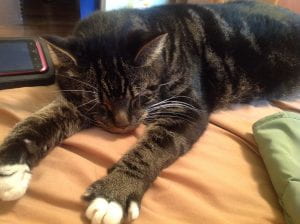
My cat, Prince, has lived with Leukemia for five years now, but he can still get pretty energetic when there’s something to attack.
Hello all!
Race and media are my research interests and New Orleans is my hometown, essentially.
My professional bio goes like this: Dr. Loggins is an assistant professor at Fort Hays State in Kansas with 10 years of experience in Higher Ed and a journalism background from Alabama and Louisiana. She has a passion for teaching solid journalism and solid writing skills, and a passion for her research.
She likes to emphasize learning through doing. Her focus on action-oriented learning helped her win the Scripps Howard Visiting Professor in Social Media grant to visit a national news bureau in Washington, D.C.
She started in news decades ago as a teleprompter operator at ABC 26 in New Orleans and moved up to Control Room Operations at that station. Shortly after moving to Tuscaloosa, Alabama, she switched to journalism and produced a variety of award-winning newscasts at WVUA-TV, before deciding to return to school. She earned her master’s and doctorate at the University of Alabama before moving to the midwest.
Her publications have touched on a variety of media topics from multimedia protest coverage to early television news history, but her main interest is race and the media. She’s examined how local news may impact viewer prejudice and examined best practices for suspect descriptions. Her entry in The Sage Encyclopedia of Higher Education on the socialization of crime alerts was published this past summer. She also recently co-authored a chapter in From Tahrir Square to Ferguson on the online coverage of protests after Michael Brown’s death.
When not under quarantine, she splits her time between Hays and visits to her family in Topeka. She usually lives with her two cats, Prince and Faffy. Her husband usually lives with their dog. Havoc. Once life “returns to normal” feel free to let her know if you are thinking of a trip to New Orleans. With plenty of friends and family still in that area, she’d be happy to provide you with travel tips.
You are welcome to post a shorter bio, if you wish, or a longer one. When it comes to discussing the news I was intrigued by two versions of one story. Both discuss a Minneapolis store thrown into the middle of the debate on racism and Black Lives Matter.
One story aired on Weekend Edition Saturday. Another story on that same topic aired on Code Switch. If you follow the show links, you’ll see that Weekend Edition “offers a mix of analysis and features on a wide range of topics, including arts, sports, entertainment, and human interest stories…. [The host] brings a humorous, sophisticated and often moving perspective to each show.” Code Switch, on the other hand, features “the fearless conversations about race that you’ve been waiting for! Hosted by journalists of color, our podcast tackles the subject of race head-on…. This podcast makes ALL OF US part of the conversation — because we’re all part of the story.”
In other words, Weekend Edition may recognize race, but it doesn’t usually center race in its discussion. Code Switch does. If you listen to Code Switch regularly, such as the recent “What Now, White People” episode, you learn that the hosts see their show as popular among people of color and, usually, largely ignored by White America. They are also cognizant of the fact that most NPR shows, like Weekend Edition, are popular with many White Middle-Class people.
So, my question is, do you think both stories are told objectively, neither is, the Saturday version is more unbiased, or the Code Switch version is more unbiased? I’d love to hear your thoughts. Personally, I think the Code Switch version is more objective because 1) it sees race and 2) race is front and center in this story.
For example. Code Switch makes a point to note the problem with Majdi Wadi reaching out to El-Amin to make amends to the Black community. Weekend Edition rarely critiques or comments on what Majdi Wadi’s says or does that suggests he misunderstands White Supremacy Culture. Ignoring his missteps suggests they do not exist and is therefore biased in favor of continued White Fragility.

Master the essentials of Salesforce NPSP. This course prepares consultants to support nonprofit organizations by aligning Salesforce tools with mission-driven goals. Gain the skills needed to implement, configure, and optimize NPSP solutions. Ideal for professionals seeking Salesforce certification and a deeper understanding of nonprofit success through technology.
Website: https://www.dumpsmate.com/NP-Con-101-exam.html